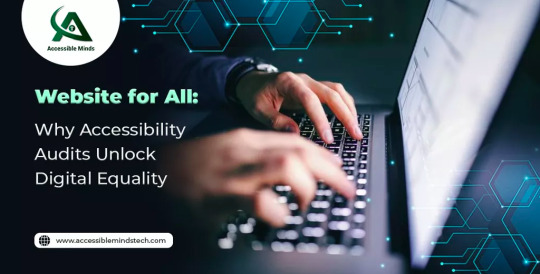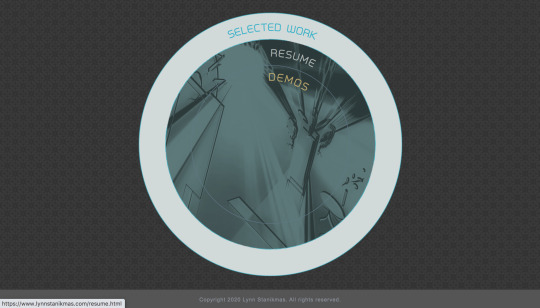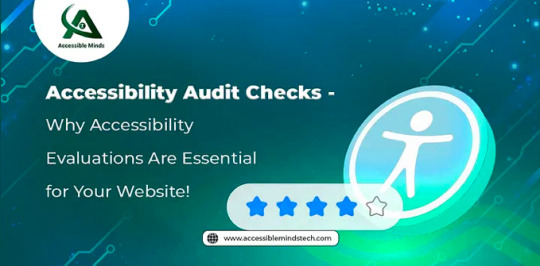#Web Accessibility Development Services
Text

Accessibility is not a privilege but a right remarked Tim Berners-Lee, the inventor of the World Wide Web. Do You Love Our Reads Then Click Here:https://rb.gy/iej903 Click Here To Visit:https://rb.gy/uoyxqq
#Accessible Minds Tech#Accessible Minds#accessibility experts#Accessibility Solutions#Accessibility Evaluation#Accessibility Evaluation Services#Accessibility Evaluation Experts#accessibility component#fixing accessibility component#Recommendations for fixing accessibility component#Accessibility component recommendations#Drafting Voluntary Product Accessibility Template#Drafting VPAT services#VPAT’s developing services#Accessibility Design Review#Design Review for Accessibility#Accessibility visual elements review#Website Accessibility Remediation#Accessibility remediation and fixing services#Website Remediation and Fixing Services#Document Accessibility Services#Document testing and remediation#Document accessibility testing and remediation#Web Accessibility Development Services#Web Accessibility services#Web Accessibility Development experts#Digital Accessibility Testing Services#Accessibility Testing Services#Digital accessibility services
1 note
·
View note
Text

The Americans with Disabilities Act (ADA) prohibits discrimination based on disability, and this extends to the digital realm. But this is where digital accessibility services come in to play a crucial role in ensuring digital accessibility. Click Here: https://rb.gy/lzuuh5
#Accessible Minds Tech#Accessible Minds#accessibility experts#Accessibility Solutions#Accessibility Evaluation#Accessibility Evaluation Services#Accessibility Evaluation Experts#accessibility component#fixing accessibility component#Recommendations for fixing accessibility component#Accessibility component recommendations#Drafting Voluntary Product Accessibility Template#Drafting VPAT services#VPAT’s developing services#Accessibility Design Review#Design Review for Accessibility#Accessibility visual elements review#Website Accessibility Remediation#Accessibility remediation and fixing services#Website Remediation and Fixing Services#Document Accessibility Services#Document testing and remediation#Document accessibility testing and remediation#Web Accessibility Development Services#Web Accessibility services#Web Accessibility Development experts#Digital Accessibility Testing Services#Accessibility Testing Services#Digital accessibility services
0 notes
Text
𝗟𝗼𝗼𝗸𝗶𝗻𝗴 𝗳𝗼𝗿 𝘀𝗼𝗺𝗲 𝗨𝗜/𝗨𝗫 W𝗲𝗯𝘀𝗶𝘁𝗲 𝗶𝗻𝘀𝗽𝗶𝗿𝗮𝘁𝗶𝗼𝗻?

Check out #UxTitan top picks! We’ve handpicked a selection of visually stunning, user-friendly sites that are sure to impress.
𝗛𝗲𝗿𝗲’𝘀 𝘄𝗵𝗮𝘁 𝘆𝗼𝘂’𝗹𝗹 𝗹𝗼𝘃𝗲:
✅ Sleek designs that are eye-catching and intuitive to navigate
✅ Innovative features that elevate the user experience
✅ Websites crafted to deliver seamless and efficient interactions
Want to see more? Follow us at @uxtitan_official and get inspired by exceptional web design! We can't wait to hear what you think!
#artists on tumblr#batman#bill cipher#billford#deadpool and wolverine#dungeon meshi#gravity falls#house of the dragon#hugh jackman#jujutsu kaisen#web development#web design#web graphics#web weaving#tech#technology#graphic design#ui ux design#ui ux company#ui ux development services#ui ux agency#ui ux development company#productdesign#userexperience#website agency#website analytics#website and app development company#website accessibility#website audit#digital marketing
4 notes
·
View notes
Text
visit my new tag #ellis's adventures in late capitalism customer service and predatory business practices for highly entertaining accounts of my experiences dealing with any kind of company's or government's wonderful treatment of their obviously very strongly valued customers and their very astronomically high quality offered services
#psalms#a new tag for any rant posts like the last one i just made or the one from a few weeks ago about the fun of cancelling a subscription#under the influence of current day late capitalism business management practices#truly makes me feel seen and cared for as a client i promise you#10/10 customer service would recommend if you want to have a laff at how hilariously atrocious someone is at doing their job#or at how fucking deluisonal companies and businesses can be when faced with even a little bit of notoriety#and dont even get me started about government offered services and how much i love having to get anything from them#quebec's gubbermint cant even make a website that doesnt look like it's still the year 2005 and whose menus make any kind of sense#like yall trying to find information about anything on a gov site is a lost cause both in the case of qc and canada#both official government sites couldn't be more confusing and disjointed and info couldn't be any harder to access if it was on purpose#their websites are so so so badly made that it's almost fucking hilarious#i have never felt frustration such as when we were working on my wife's immigration papers and had to find answers on the CIA's website#canadian immigration agency you know that cia not... you get it#maybe put some of those tax dollars you love allocating to military budgets à la con into making yourself an usable website you fucks#maybe with some of the money you're not actually fixing roads and schools and hospitals with you could hire a web developer#anyways#im v mad w the state of things tonite :)#ellis's adventures in late capitalism customer service and predatory business practices
3 notes
·
View notes
Link
Are you looking for ways to make sure your website is accessible and SEO-friendly? Learn how they work together, and the steps you can take to ensure your CMS is optimized for SEO and accessibility while boosting organic traffic.
#seo#seo friendly#web accessibility#wcag#web accessibility compliance#keyword research#seo keywords#alt text#screenreader#cms#content management system#wordpress#shopify#wix#squarespace#web design#hosting services#web development#marketing#jacksonville#discovertec
2 notes
·
View notes
Text

Do you need a website?
just CLICK HERE and build your own website by your choice.
https://go.fiverr.com/visit/?bta=1026601&brand=fiverrmarketplace&landingPage=https%253A%252F%252Fwww.fiverr.com%252Fs%252FKe716Q4
#Website Design#Web Development#Responsive Web Design#UI/UX Design#Web Design Trends#Custom Web Design#Web Development Services#Front-End Development#Back-End Development#Full-Stack Development#WordPress Design#E-commerce Web Design#Website Redesign#Mobile Web Design#Web Design Inspiration#Website Optimization#SEO Web Design#Web Design Best Practices#Website User Experience#Web Design Principles#Graphic Design for Websites#Website Development Tools#Content Management Systems#Website Speed Optimization#HTML/CSS Design#JavaScript Development#Website Accessibility#Interactive Web Design#Website Prototyping#Web Design Software
0 notes
Text
EvolutionaryScale Secures $142M to Advance Generative AI in Biology
New Post has been published on https://thedigitalinsider.com/evolutionaryscale-secures-142m-to-advance-generative-ai-in-biology/
EvolutionaryScale Secures $142M to Advance Generative AI in Biology
EvolutionaryScale, an artificial intelligence startup focused on biology, has announced a successful seed funding round, raising $142 million. The company aims to leverage generative AI models to drive innovation and accelerate discoveries in the field of biology. With this significant investment, EvolutionaryScale is poised to make significant strides in applying AI to solve complex biological challenges.
Founding Team and Backers
EvolutionaryScale was founded by a team of former Meta AI researchers, led by Alexander Rives, Tom Secru, and Sal Candido. Their expertise in machine learning and computational biology has been instrumental in shaping the company’s vision and approach. The seed funding round was led by prominent investors, including Nat Friedman, Daniel Gross, and Lux Capital. The round also saw participation from Amazon Web Services (AWS) and Nvidia’s venture capital arm, NVentures, demonstrating the strong industry support for EvolutionaryScale’s mission.
ESM3: A Frontier Model for Biology
At the core of EvolutionaryScale’s technology is ESM3, a cutting-edge AI model trained on a vast dataset of 2.78 billion proteins. This model has the capability to generate novel proteins, opening up new avenues for scientific research and applications. ESM3 can reason over the sequence, structure, and function of proteins, enabling it to create proteins with desired characteristics and functionalities.
To promote accessibility and collaboration, EvolutionaryScale has made ESM3 available for non-commercial use. Additionally, the company has partnered with AWS and Nvidia to provide access to ESM3 through their respective platforms, allowing select customers to leverage the model’s capabilities for their research and development efforts.
EvolutionaryScale’s ESM3 model has far-reaching implications across various domains. In the pharmaceutical industry, the model’s ability to generate novel proteins can significantly accelerate drug discovery and development processes. By designing proteins with specific therapeutic properties, researchers can identify new drug targets and create innovative treatments for a wide range of diseases.
Moreover, ESM3 has the potential to facilitate the creation of entirely new classes of therapeutics. By leveraging the model’s capabilities, scientists can explore uncharted protein design spaces and develop novel biomolecules with enhanced efficacy and specificity. This could lead to groundbreaking advancements in personalized medicine and targeted therapies.
Beyond healthcare, EvolutionaryScale’s technology can also contribute to environmental protection efforts. For instance, the model could be used to design enzymes capable of degrading plastic waste, offering a sustainable solution to the growing problem of plastic pollution.
Overall, ESM3 has the potential to significantly accelerate scientific research across various fields. By providing researchers with a powerful tool to explore protein design and function, EvolutionaryScale is enabling faster and more efficient discovery processes, ultimately leading to transformative breakthroughs.
EvolutionaryScale
Competitive Landscape
EvolutionaryScale is not alone in its pursuit of applying AI to biology. Several other notable players in the field include DeepMind’s Isomorphic Labs, Insitro, Recursion, and Inceptive. These companies are also leveraging AI and machine learning techniques to advance drug discovery and development.
However, EvolutionaryScale differentiates itself by focusing on scaling model training with broader biological data. By training ESM3 on a vast dataset encompassing 2.78 billion proteins, the company has created a model with unparalleled breadth and depth. This comprehensive training enables ESM3 to capture the intricacies and diversity of protein biology, potentially leading to more accurate and effective protein design.
Looking ahead, EvolutionaryScale aims to expand its capabilities beyond protein design. The company envisions developing a general-purpose AI model for biotech applications, capable of tackling a wide range of biological challenges. By continuously refining and scaling its models, EvolutionaryScale seeks to become a leading force in the intersection of AI and biology, driving transformative innovations across multiple industries.
A New Era of AI-Driven Biological Innovation
EvolutionaryScale’s successful seed funding round marks a significant milestone in the application of generative AI to biology. With its groundbreaking ESM3 model and a strong team of experts, the company is well-positioned to revolutionize drug discovery, therapeutics, and environmental solutions. By leveraging the power of AI to design novel proteins, EvolutionaryScale is opening up new possibilities for scientific breakthroughs and transformative innovations. As the company navigates the challenges ahead and expands its capabilities, it has the potential to become a driving force in shaping the future of AI-driven biological research and development.
#Accessibility#ai#ai model#AI models#Amazon#Amazon Web Services#applications#approach#arm#artificial#Artificial Intelligence#AWS#billion#Biology#Biomolecules#biotech#Capture#classes#Collaboration#Companies#comprehensive#Computational biology#cutting#data#DeepMind#Design#development#Discoveries#Diseases#diversity
0 notes
Text

Accessible Websites
Design websites with features and functionalities that enable individuals with disabilities to access and interact with online content effectively, promoting a more inclusive and equitable digital experience!
#ADA Website Compliance Benefits#ADA Compliance#ADA Accessibility#Americans with Disabilities Act (ADA)#Web Accessibility#ADA Website Benefits#Web Content Accessibility Guidelines (WCAG)#ADA Compliant Websites#Accessibility Standards#Accessible Websites#Digital Accessibility#Free Website Scan#ada site compliance#web accessibility#accessibility services#diversity and inclusion#ada guidelines#inclusive design#accessible website development#ada compliance solutions#web accessibility audit#digital accessibility#equitable web design#ada regulations#inclusive user experience#ada consulting#accessible content#ada accessibility#web design for disabilities#disability compliance
0 notes
Text












Responsive web user interface (UI) concept, via jQuery without media queries. CSS transitions on accessibility-compliant SVGs.
#jquery#responsive web design company#responsivewebsite#responsivedesign#responsive web development#website development#website#websites#developers#software development#web graphics#accessibility#a11y#web design#ui ux development services#uidesign#ui ux design#ui#ux#user interface#design#html5 css3#html css#html#html5#htmlcoding#css#frontend#code#svg
1 note
·
View note
Text
#Advantages for Companies that Develop Websites#api#APIs in Custom Development#APIs in Web Development#Representational State Transfer#RESTful#Role of APIs in Web Development#Simple Object Access Protocol#SOAP#web development#web development services#Webhooks
0 notes
Text

Accessibility is not just a trend but it’s a fundamental necessity in today’s digital era. With over 1.3 billion people worldwide living with some form of disability, ensuring that your website is accessible to all users is both a moral and business imperative. Do You Love Our Reads Then Click Here:https://rb.gy/vwu7qb Click Here To Visit:https://rb.gy/uoyxqq
#Accessible Minds Tech#Accessible Minds#accessibility experts#Accessibility Solutions#Accessibility Evaluation#Accessibility Evaluation Services#Accessibility Evaluation Experts#accessibility component#fixing accessibility component#Recommendations for fixing accessibility component#Accessibility component recommendations#Drafting Voluntary Product Accessibility Template#Drafting VPAT services#VPAT’s developing services#Accessibility Design Review#Design Review for Accessibility#Accessibility visual elements review#Website Accessibility Remediation#Accessibility remediation and fixing services#Website Remediation and Fixing Services#Document Accessibility Services#Document testing and remediation#Document accessibility testing and remediation#Web Accessibility Development Services#Web Accessibility services#Web Accessibility Development experts#Digital Accessibility Testing Services#Accessibility Testing Services#Digital accessibility services
1 note
·
View note
Text

“Unlocking digital doors for everyone leads to inclusive growth and unmatched opportunities.” The significance of an inclusive online presence cannot be overstated in today’s competitive digital landscape. As e-commerce continues to dominate, ensuring that your website is accessible to all users, including those with disabilities, is not just a legal obligation but a strategic business advantage. Accessibility testing services play a pivotal role in this regard, helping businesses optimize their websites to cater to a broader audience, thereby driving growth and enhancing customer loyalty. Click Here: https://rb.gy/hutkjh
#Accessible Minds Tech#Accessible Minds#accessibility experts#Accessibility Solutions#Accessibility Evaluation#Accessibility Evaluation Services#Accessibility Evaluation Experts#accessibility component#fixing accessibility component#Recommendations for fixing accessibility component#Accessibility component recommendations#Drafting Voluntary Product Accessibility Template#Drafting VPAT services#VPAT’s developing services#Accessibility Design Review#Design Review for Accessibility#Accessibility visual elements review#Website Accessibility Remediation#Accessibility remediation and fixing services#Website Remediation and Fixing Services#Document Accessibility Services#Document testing and remediation#Document accessibility testing and remediation#Web Accessibility Development Services#Web Accessibility services#Web Accessibility Development experts#Digital Accessibility Testing Services#Accessibility Testing Services#Digital accessibility services
1 note
·
View note
Text
Web Accessibility :Why IT Matters and How to Implement IT

In the digital age, websites have become the primary means of accessing information, services, and resources. They have opened up a world of possibilities, making it easier for people to connect, learn, work, and perform everyday tasks online. However, for some individuals, accessing the internet can be a challenging or frustrating experience.
Web accessibility is the key to addressing this issue, ensuring that websites are inclusive and usable for everyone, regardless of their abilities or disabilities. In this comprehensive guide, we will explore the importance of web accessibility and provide practical steps on how to implement it.
1.The Significance of Web Accessibility
Web accessibility refers to the practice of designing and developing websites and web applications that can be used by people with disabilities. Disabilities can be permanent, temporary, or situational and include conditions like visual, auditory, motor, or cognitive impairments. Making websites accessible means removing barriers and providing alternatives that enable people with disabilities to perceive, understand, and interact with web content effectively.
-Inclusivity for All:
The primary reason why web accessibility matters is inclusivity. The internet should be a place where everyone has the opportunity to participate equally, regardless of their physical or cognitive abilities. This inclusivity extends to individuals with various disabilities, including but not limited to:
Visual impairments: Blindness, low vision, color blindness.
Auditory impairments: Deafness, hard of hearing.
Motor impairments: Limited dexterity, tremors.
Cognitive impairments: Dyslexia, attention disorders, memory issues.
-Legal and Ethical Obligations:
Many countries have recognized the importance of web accessibility and have enacted laws to ensure compliance. In the United States, for instance, the Americans with Disabilities Act (ADA) and Section 508 of the Rehabilitation Act require federal agencies and contractors to make their digital content accessible. Non-compliance can result in legal consequences. Beyond legal obligations, ethical considerations are equally vital. Building accessible websites is a step toward creating a more inclusive and equitable digital environment.
-Wider Reach and Audience:
Prioritizing web accessibility can expand your website’s reach and audience. An accessible website not only caters to people with disabilities but also benefits older individuals, those with temporary impairments (e.g., a broken arm), and even those in noisy environments. The broader your audience, the greater your impact, whether you’re a business, government entity, educational institution, or individual content creator.
-SEO and Improved Search Rankings:
Search engines like Google consider web accessibility when ranking websites. By optimizing your site for accessibility, you improve its SEO performance, making it more discoverable and easier to find. Search engines reward websites that offer a seamless user experience for all visitors.
2. Implementing Web Accessibility
Steps to Ensure an Accessible Website
Implementing web accessibility involves a combination of design, development, and content considerations. The goal is to make your website perceivable, operable, understandable, and robust for all users. Here are the key steps to achieving web accessibility:
-Use Semantic HTML:
Semantic HTML elements: Use appropriate HTML tags (e.g., headings, lists, tables) to structure your content. This helps screen readers and assistive technologies understand the content’s hierarchy and context.
-Provide Alternative Text for Images:
Alt attributes: Always include descriptive alt attributes for images. These descriptions help users with visual impairments understand the content and context of the images.
– Ensure Keyboard Accessibility:
Keyboard navigation: Make sure all interactive elements, links, and forms are accessible and operable via a keyboard. Avoid reliance on mouse-specific actions.
– Use ARIA Roles and Attributes:
ARIA (Accessible Rich Internet Applications) attributes: Employ ARIA roles and attributes to enhance the accessibility of dynamic web content, such as single-page applications and web applications.
-Captions and Transcripts for Multimedia:
Multimedia content: Provide captions for videos and audio content. Additionally, offer text transcripts for audio content, which aids both users with disabilities and those in noise-sensitive environments.
-Ensure Proper Heading Structure:
Headings hierarchy: Use a clear and consistent heading structure throughout your web pages. Heading tags (H1, H2, H3, etc.) provide a logical order for screen reader users to navigate.
– Color and Contrast:
Color choices: Ensure sufficient color contrast between text and background to improve readability for users with low vision or color blindness.
– Form Accessibility:
Label forms: Label all form fields with clear and concise labels. Provide error messages that are clear and informative.
– Focus Management:
Focus indicators: Clearly define focus states for interactive elements to make them easily identifiable when using a keyboard or assistive technology.
-Test with Assistive Technologies:
Screen readers and other assistive devices: Regularly test your website with screen readers, speech recognition software, and other assistive technologies to identify and address accessibility issues.
-Regular Accessibility Audits:
Ongoing evaluation: Conduct regular accessibility audits to identify and rectify issues as your website evolves. Automated tools, user testing, and expert audits can be valuable resources.
3: Web Accessibility Beyond Compliance
Striving for Inclusive Excellence
While achieving compliance with accessibility standards is essential, web accessibility should not be viewed as a mere checkbox item. Strive for inclusive excellence by going beyond the minimum requirements. Here are some additional considerations:
User-Centered Design:
User personas: Understand the needs, preferences, and challenges of different user groups, including those with disabilities.
User Testing:
User feedback: Regularly gather feedback from users with disabilities to improve your website’s accessibility.
Education and Awareness:
Training: Educate your team about web accessibility best practices and foster a culture of accessibility awareness within your organization.
Third-Party Content:
External content: Encourage third-party content providers to create accessible content when sharing materials on your website.
Continuous Improvement:
Evolution: Recognize that web accessibility is an ongoing journey. Stay informed about new technologies and best practices to continuously improve your website’s accessibility.
4: Resources for Web Accessibility
Tools and References
For those looking to delve deeper into web accessibility, the following resources can be valuable:
Web Content Accessibility Guidelines (WCAG):
WCAG: The WCAG guidelines are the globally accepted standards for web accessibility. They provide detailed recommendations and techniques for creating accessible web content.
Accessibility Evaluation Tools:
Automated tools: Various automated tools can help identify accessibility issues on your website. Some popular options include WAVE, axe, and the Accessibility Insights suite.
Assistive Technologies:
Screen readers: Familiarize yourself with popular screen readers like JAWS, NVDA, and Voice Over to understand how users with visual impairments access websites.
Online Courses and Training:
Online courses: Platforms like Coursera, edX, and Udacity offer courses on web accessibility, including those from experts in the field.
Accessibility Communities and Forums:
Online communities: Join online forums, mailing lists, or social media groups dedicated to web accessibility to stay up-to-date with the latest developments and best practices.
Conclusion
Web accessibility is not merely a legal requirement; it is a moral and practical imperative. Creating an inclusive digital space benefits everyone, making the internet a more accessible and enjoyable place for all users.
By understanding the significance of web accessibility and taking the necessary steps to implement it, you contribute to a more inclusive online world, ensuring that no one is left behind in the digital age. As web accessibility continues to evolve, staying committed to inclusive design is a commitment to a better, more equitable future for all internet users.
#Web Accessibility :Why IT Matters and How to Implement IT#web development#digital marketing#web design company in mississauga#multimedia / flash animation services#app development#digital marketing agency canada#web design agency in toronto canada#web devlopment#graphic design#web design
0 notes
Text
#ADA Tax Credit#Web accessibility#web accessibility Audit#Accessibility Audit#Accessibility Design#accessibility lawsuits#Accessibility Services#Digital Accessibility#Disabilities#Section 508#Screen Readers#WCAG#Assistive Technology#Braille Transcription#Tactile Graphics#deafblind#Hearing Impairment#Website Accessibility#web development#web design#Web accessibility design#Color Accessibility#AELData
0 notes
Text
https://beebigdigital.com/blogs/what-is-web-development
Web development refers to the process of creating, building, and maintaining websites Web development refers to the process of creating, building, and maintaining websites and web applications that are accessible via the internet. digital marketing company, digital marketing agency, digital marketing services, digital marketing agency, digital marketing company in Mumbai, digital marketing agency in mumbai, Search Engine Optimization Company, SEO Company, Social Media Marketing Company, Social Media Marketing Agency, Google Adword Company, Facebook Advertisment Company, Advertisment Company, Advertisment Agency,
#Web development refers to the process of creating#building#and maintaining websites#and maintaining websites and web applications that are accessible via the internet.#digital marketing company#digital marketing agency#digital marketing services#digital marketing company in Mumbai#digital marketing agency in mumbai#Search Engine Optimization Company#SEO Company#Social Media Marketing Company#Social Media Marketing Agency#Google Adword Company#Facebook Advertisment Company#Advertisment Company#Advertisment Agency
0 notes
Text
the great reddit API meltdown of '23, or: this was always bound to happen
there's a lot of press about what's going on with reddit right now (app shutdowns, subreddit blackouts, the CEO continually putting his foot in his mouth), but I haven't seen as much stuff talking about how reddit got into this situation to begin with. so as a certified non-expert and Context Enjoyer I thought it might be helpful to lay things out as I understand them—a high-level view, surveying the whole landscape—in the wonderful world of startups, IPOs, and extremely angry users.
disclaimer that I am not a founder or VC (lmao), have yet to work at a company with a successful IPO, and am not a reddit employee or third-party reddit developer or even a subreddit moderator. I do work at a startup, know my way around an API or two, and have spent twelve regrettable years on reddit itself. which is to say that I make no promises of infallibility, but I hope you'll at least find all this interesting.
profit now or profit later
before you can really get into reddit as reddit, it helps to know a bit about startups (of which reddit is one). and before I launch into that, let me share my Three Types Of Websites framework, which is basically just a mental model about financial incentives that's helped me contextualize some of this stuff.
(1) website/software that does not exist to make money: relatively rare, for a variety of reasons, among them that it costs money to build and maintain a website in the first place. wikipedia is the evergreen example, although even wikipedia's been subject to criticism for how the wikimedia foundation pays out its employees and all that fun nonprofit stuff. what's important here is that even when making money is not the goal, money itself is still a factor, whether it's solicited via donations or it's just one guy paying out of pocket to host a hobby site. but websites in this category do, generally, offer free, no-strings-attached experiences to their users.
(I do want push back against the retrospective nostalgia of "everything on the internet used to be this way" because I don't think that was ever really true—look at AOL, the dotcom boom, the rise of banner ads. I distinctly remember that neopets had multiple corporate sponsors, including a cookie crisp-themed flash game. yahoo bought geocities for $3.6 billion; money's always been trading hands, obvious or not. it's indisputable that the internet is simply different now than it was ten or twenty years ago, and that monetization models themselves have largely changed as well (I have thoughts about this as it relates to web 1.0 vs web 2.0 and their associated costs/scale/etc.), but I think the only time people weren't trying to squeeze the internet for all the dimes it can offer was when the internet was first conceived as a tool for national defense.)
(2) website/software that exists to make money now: the type that requires the least explanation. mostly non-startup apps and services, including any random ecommerce storefront, mobile apps that cost three bucks to download, an MMO with a recurring subscription, or even a news website that runs banner ads and/or offers paid subscriptions. in most (but not all) cases, the "make money now" part is obvious, so these things don't feel free to us as users, even to the extent that they might have watered-down free versions or limited access free trials. no one's shocked when WoW offers another paid expansion packs because WoW's been around for two decades and has explicitly been trying to make money that whole time.
(3) website/software that exists to make money later: this is the fun one, and more common than you'd think. "make money later" is more or less the entire startup business model—I'll get into that in the next section—and is deployed with the expectation that you will make money at some point, but not always by means as obvious as "selling WoW expansions for forty bucks a pop."
companies in this category tend to have two closely entwined characteristics: they prioritize growth above all else, regardless of whether this growth is profitable in any way (now, or sometimes, ever), and they do this by offering users really cool and awesome shit at little to no cost (or, if not for free, then at least at a significant loss to the company).
so from a user perspective, these things either seem free or far cheaper than their competitors. but of course websites and software and apps and [blank]-as-a-service tools cost money to build and maintain, and that money has to come from somewhere, and the people supplying that money, generally, expect to get it back...
just not immediately.
startups, VCs, IPOs, and you
here's the extremely condensed "did NOT go to harvard business school" version of how a startup works:
(1) you have a cool idea.
(2) you convince some venture capitalists (also known as VCs) that your idea is cool. if they see the potential in what you're pitching, they'll give you money in exchange for partial ownership of your company—which means that if/when the company starts trading its stock publicly, these investors will own X numbers of shares that they can sell at any time. in other words, you get free money now (and you'll likely seek multiple "rounds" of investors over the years to sustain your company), but with the explicit expectations that these investors will get their payoff later, assuming you don't crash and burn before that happens.
during this phase, you want to do anything in your power to make your company appealing to investors so you can attract more of them and raise funds as needed. because you are definitely not bringing in the necessary revenue to offset operating costs by yourself.
it's also worth nothing that this is less about projecting the long-term profitability of your company than it's about its perceived profitability—i.e., VCs want to put their money behind a company that other people will also have confidence in, because that's what makes stock valuable, and VCs are in it for stock prices.
(3) there are two non-exclusive win conditions for your startup: you can get acquired, and you can have an IPO (also referred to as "going public"). these are often called "exit scenarios" and they benefit VCs and founders, as well as some employees. it's also possible for a company to get acquired, possibly even more than once, and then later go public.
acquisition: sell the whole damn thing to someone else. there are a million ways this can happen, some better than others, but in many cases this means anyone with ownership of the company (which includes both investors and employees who hold stock options) get their stock bought out by the acquiring company and end up with cash in hand. in varying amounts, of course. sometimes the founders walk away, sometimes the employees get laid off, but not always.
IPO: short for "initial public offering," this is when the company starts trading its stocks publicly, which means anyone who wants to can start buying that company's stock, which really means that VCs (and employees with stock options) can turn that hypothetical money into real money by selling their company stock to interested buyers.
drawing from that, companies don't go for an IPO until they think their stock will actually be worth something (or else what's the point?)—specifically, worth more than the amount of money that investors poured into it. The Powers That Be will speculate about a company's IPO potential way ahead of time, which is where you'll hear stuff about companies who have an estimated IPO evaluation of (to pull a completely random example) $10B. actually I lied, that was not a random example, that was reddit's valuation back in 2021 lol. but a valuation is basically just "how much will people be interested in our stock?"
as such, in the time leading up to an IPO, it's really really important to do everything you can to make your company seem like a good investment (which is how you get stock prices up), usually by making the company's numbers look good. but! if you plan on cashing out, the long-term effects of your decisions aren't top of mind here. remember, the industry lingo is "exit scenario."
if all of this seems like a good short-term strategy for companies and their VCs, but an unsustainable model for anyone who's buying those stocks during the IPO, that's because it often is.
also worth noting that it's possible for a company to be technically unprofitable as a business (meaning their costs outstrip their revenue) and still trade enormously well on the stock market; uber is the perennial example of this. to the people who make money solely off of buying and selling stock, it literally does not matter that the actual rideshare model isn't netting any income—people think the stock is valuable, so it's valuable.
this is also why, for example, elon musk is richer than god: if he were only the CEO of tesla, the money he'd make from selling mediocre cars would be (comparatively, lol) minimal. but he's also one of tesla's angel investors, which means he holds a shitload of tesla stock, and tesla's stock has performed well since their IPO a decade ago (despite recent dips)—even if tesla itself has never been a huge moneymaker, public faith in the company's eventual success has kept them trading at high levels. granted, this also means most of musk's wealth is hypothetical and not liquid; if TSLA dropped to nothing, so would the value of all the stock he holds (and his net work with it).
what's an API, anyway?
to move in an entirely different direction: we can't get into reddit's API debacle without understanding what an API itself is.
an API (short for "application programming interface," not that it really matters) is a series of code instructions that independent developers can use to plug their shit into someone else's shit. like a series of tin cans on strings between two kids' treehouses, but for sending and receiving data.
APIs work by yoinking data directly from a company's servers instead of displaying anything visually to users. so I could use reddit's API to build my own app that takes the day's top r/AITA post and transcribes it into pig latin: my app is a bunch of lines of code, and some of those lines of code fetch data from reddit (and then transcribe that data into pig latin), and then my app displays the content to anyone who wants to see it, not reddit itself. as far as reddit is concerned, no additional human beings laid eyeballs on that r/AITA post, and reddit never had a chance to serve ads alongside the pig-latinized content in my app. (put a pin in this part—it'll be relevant later.)
but at its core, an API is really a type of protocol, which encompasses a broad category of formats and business models and so on. some APIs are completely free to use, like how anyone can build a discord bot (but you still have to host it yourself). some companies offer free APIs to third-party developers can build their own plugins, and then the company and the third-party dev split the profit on those plugins. some APIs have a free tier for hobbyists and a paid tier for big professional projects (like every weather API ever, lol). some APIs are strictly paid services because the API itself is the company's core offering.
reddit's financial foundations
okay thanks for sticking with me. I promise we're almost ready to be almost ready to talk about the current backlash.
reddit has always been a startup's startup from day one: its founders created the site after attending a startup incubator (which is basically a summer camp run by VCs) with the successful goal of creating a financially successful site. backed by that delicious y combinator money, reddit got acquired by conde nast only a year or two after its creation, which netted its founders a couple million each. this was back in like, 2006 by the way. in the time since that acquisition, reddit's gone through a bunch of additional funding rounds, including from big-name investors like a16z, peter thiel (yes, that guy), sam altman (yes, also that guy), sequoia, fidelity, and tencent. crunchbase says that they've raised a total of $1.3B in investor backing.
in all this time, reddit has never been a public company, or, strictly speaking, profitable.
APIs and third-party apps
reddit has offered free API access for basically as long as it's had a public API—remember, as a "make money later" company, their primary goal is growth, which means attracting as many users as possible to the platform. so letting anyone build an app or widget is (or really, was) in line with that goal.
as such, third-party reddit apps have been around forever. by third-party apps, I mean apps that use the reddit API to display actual reddit content in an unofficial wrapper. iirc reddit didn't even have an official mobile app until semi-recently, so many of these third-party mobile apps in particular just sprung up to meet an unmet need, and they've kept a small but dedicated userbase ever since. some people also prefer the user experience of the unofficial apps, especially since they offer extra settings to customize what you're seeing and few to no ads (and any ads these apps do display are to the benefit of the third-party developers, not reddit itself.)
(let me add this preemptively: one solution I've seen proposed to the paid API backlash is that reddit should have third-party developers display reddit's ads in those third-party apps, but this isn't really possible or advisable due to boring adtech reasons I won't inflict on you here. source: just trust me bro)
in addition to mobile apps, there are also third-party tools that don’t replace the Official Reddit Viewing Experience but do offer auxiliary features like being able to mass-delete your post history, tools that make the site more accessible to people who use screen readers, and tools that help moderators of subreddits moderate more easily. not to mention a small army of reddit bots like u/AutoWikibot or u/RemindMebot (and then the bots that tally the number of people who reply to bot comments with “good bot” or “bad bot).
the number of people who use third-party apps is relatively small, but they arguably comprise some of reddit’s most dedicated users, which means that third-party apps are important to the people who keep reddit running and the people who supply reddit with high-quality content.
unpaid moderators and user-generated content
so reddit is sort of two things: reddit is a platform, but it’s also a community.
the platform is all the unsexy (or, if you like python, sexy) stuff under the hood that actually makes the damn thing work. this is what the company spends money building and maintaining and "owns." the community is all the stuff that happens on the platform: posts, people, petty squabbles. so the platform is where the content lives, but ultimately the content is the reason people use reddit—no one’s like “yeah, I spend time on here because the backend framework really impressed me."
and all of this content is supplied by users, which is not unique among social media platforms, but the content is also managed by users, which is. paid employees do not govern subreddits; unpaid volunteers do. and moderation is the only thing that keeps reddit even remotely tolerable—without someone to remove spam, ban annoying users, and (god willing) enforce rules against abuse and hate speech, a subreddit loses its appeal and therefore its users. not dissimilar to the situation we’re seeing play out at twitter, except at twitter it was the loss of paid moderators; reddit is arguably in a more precarious position because they could lose this unpaid labor at any moment, and as an already-unprofitable company they absolutely cannot afford to implement paid labor as a substitute.
oh yeah? spell "IPO" backwards
so here we are, June 2023, and reddit is licking its lips in anticipation of a long-fabled IPO. which means it’s time to start fluffing themselves up for investors by cutting costs (yay, layoffs!) and seeking new avenues of profit, however small.
this brings us to the current controversy: reddit announced a new API pricing plan that more or less prevents anyone from using it for free.
from reddit's perspective, the ostensible benefits of charging for API access are twofold: first, there's direct profit to be made off of the developers who (may or may not) pay several thousand dollars a month to use it, and second, cutting off unsanctioned third-party mobile apps (possibly) funnels those apps' users back into the official reddit mobile app. and since users on third-party apps reap the benefit of reddit's site architecture (and hosting, and development, and all the other expenses the site itself incurs) without “earning” money for reddit by generating ad impressions, there’s a financial incentive at work here: even if only a small percentage of people use third-party apps, getting them to use the official app instead translates to increased ad revenue, however marginal.
(also worth mentioning that chatGPT and other LLMs were trained via tools that used reddit's API to scrape post and content data, and now that openAI is reaping the profits of that training without giving reddit any kickbacks, reddit probably wants to prevent repeats of this from happening in the future. if you want to train the next LLM, it's gonna cost you.)
of course, these changes only benefit reddit if they actually increase the company’s revenue and perceived value/growth—which is hard to do when your users (who are also the people who supply the content for other users to engage with, who are also the people who moderate your communities and make them fun to participate in) get really fucking pissed and threaten to walk.
pricing shenanigans
under the new API pricing plan, third-party developers are suddenly facing steep costs to maintain the apps and tools they’ve built.
most paid APIs are priced by volume: basically, the more data you send and receive, the more money it costs. so if your third-party app has a lot of users, you’ll have to make more API requests to fetch content for those users, and your app becomes more expensive to maintain. (this isn’t an issue if the tool you’re building also turns a profit, but most third-party reddit apps make little, if any, money.)
which is why, even though third-party apps capture a relatively small portion of reddit’s users, the developer of a popular third-party app called apollo recently learned that it would cost them about $20 million a year to keep the app running. and apollo actually offers some paid features (for extra in-app features independent of what reddit offers), but nowhere near enough to break even on those API costs.
so apollo, any many apps like it, were suddenly unable to keep their doors open under the new API pricing model and announced that they'd be forced to shut down.
backlash, blackout
plenty has been said already about the current subreddit blackouts—in like, official news outlets and everything—so this might be the least interesting section of my whole post lol. the short version is that enough redditors got pissed enough that they collectively decided to take subreddits “offline” in protest, either by making them read-only or making them completely inaccessible. their goal was to send a message, and that message was "if you piss us off and we bail, here's what reddit's gonna be like: a ghost town."
but, you may ask, if third-party apps only captured a small number of users in the first place, how was the backlash strong enough to result in a near-sitewide blackout? well, two reasons:
first and foremost, since moderators in particular are fond of third-party tools, and since moderators wield outsized power (as both the people who keep your site more or less civil, and as the people who can take a subreddit offline if they feel like it), it’s in your best interests to keep them happy. especially since they don’t get paid to do this job in the first place, won’t keep doing it if it gets too hard, and essentially have nothing to lose by stepping down.
then, to a lesser extent, the non-moderator users on third-party apps tend to be Power Users who’ve been on reddit since its inception, and as such likely supply a disproportionate amount of the high-quality content for other users to see (and for ads to be served alongside). if you drive away those users, you’re effectively kneecapping your overall site traffic (which is bad for Growth) and reducing the number/value of any ad impressions you can serve (which is bad for revenue).
also a secret third reason, which is that even people who use the official apps have no stake in a potential IPO, can smell the general unfairness of this whole situation, and would enjoy the schadenfreude of investors getting fucked over. not to mention that reddit’s current CEO has made a complete ass of himself and now everyone hates him and wants to see him suffer personally.
(granted, it seems like reddit may acquiesce slightly and grant free API access to a select set of moderation/accessibility tools, but at this point it comes across as an empty gesture.)
"later" is now "now"
TL;DR: this whole thing is a combination of many factors, specifically reddit being intensely user-driven and self-governed, but also a high-traffic site that costs a lot of money to run (why they willingly decided to start hosting video a few years back is beyond me...), while also being angled as a public stock market offering in the very near future. to some extent I understand why reddit’s CEO doubled down on the changes—he wants to look strong for investors—but he’s also made a fool of himself and cast a shadow of uncertainty onto reddit’s future, not to mention the PR nightmare surrounding all of this. and since arguably the most important thing in an IPO is how much faith people have in your company, I honestly think reddit would’ve fared better if they hadn’t gone nuclear with the API changes in the first place.
that said, I also think it’s a mistake to assume that reddit care (or needs to care) about its users in any meaningful way, or at least not as more than means to an end. if reddit shuts down in three years, but all of the people sitting on stock options right now cashed out at $120/share and escaped unscathed... that’s a success story! you got your money! VCs want to recoup their investment—they don’t care about longevity (at least not after they’re gone), user experience, or even sustained profit. those were never the forces driving them, because these were never the ultimate metrics of their success.
and to be clear: this isn’t unique to reddit. this is how pretty much all startups operate.
I talked about the difference between “make money now” companies and “make money later” companies, and what we’re experiencing is the painful transition from “later” to “now.” as users, this change is almost invisible until it’s already happened—it’s like a rug we didn’t even know existed gets pulled out from under us.
the pre-IPO honeymoon phase is awesome as a user, because companies have no expectation of profit, only growth. if you can rely on VC money to stay afloat, your only concern is building a user base, not squeezing a profit out of them. and to do that, you offer cool shit at a loss: everything’s chocolate and flowers and quarterly reports about the number of signups you’re getting!
...until you reach a critical mass of users, VCs want to cash in, and to prepare for that IPO leadership starts thinking of ways to make the website (appear) profitable and implements a bunch of shit that makes users go “wait, what?”
I also touched on this earlier, but I want to reiterate a bit here: I think the myth of the benign non-monetized internet of yore is exactly that—a myth. what has changed are the specific market factors behind these websites, and their scale, and the means by which they attempt to monetize their services and/or make their services look attractive to investors, and so from a user perspective things feel worse because the specific ways we’re getting squeezed have evolved. maybe they are even worse, at least in the ways that matter. but I’m also increasingly less surprised when this occurs, because making money is and has always been the goal for all of these ventures, regardless of how they try to do so.
8K notes
·
View notes